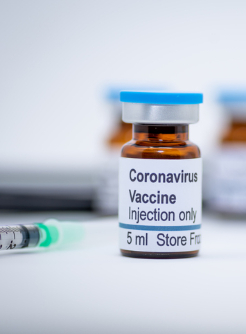One in Three Adults with Heart Disease Do Not Receive Recommended Vaccines
By Alexa Josaphouitch, /alert Contributor
May 13, 2020
Nearly one in three adults with heart disease are not vaccinated for influenza in the US, according to preliminary research presented at the American Heart Association's Scientific Sessions. Vaccination rates are lower for those who are uninsured and those who lack regular medical care.
"Our study sheds light on key inequalities related to disparities in flu vaccination rates. We hope that flu vaccinations among heart disease patients becomes an integral part of quality of care measures and will facilitate processes to limit these unintended care gaps among the most vulnerable in our society," senior author Khurram Nasir, chief of Cardiovascular Prevention & director of Outcome Research at Houston Methodist, said..jpg)
The survey included adults over 40 with atherosclerotic cardiovascular disease (ASCVD). Participants were in the national Medical Expenditure Panel Survey between 2008 and 2015 and had experienced a stroke, heart attack, or had other conditions related to clogged arteries. The respondents were asked whether they received a flu vaccine in the last 12 months. Of the 15,268 respondents who reported ASCVD, nearly one in three (32%, 95% CI: 30.2%, 33.0%) of them did not receive a flu vaccination in the past year.
Vaccination rates were significantly lower among younger individuals, non-Hispanic blacks, those without a usual source of care and insurance, and among those with a lower level of education and household income. The lowest vaccination coverage was uninsured low-income individuals (65%). About 30% of middle/high-income insured individuals with ASCVD had not been vaccinated.
"Cardiologists, primary care doctors and other clinicians need to have a conversation about flu vaccination well in advance of the onset of flu season to encourage patients to have routine follow-up appointments early in the flu season,” co-author Gowtham Rama Harsha Grandhi, MedStar Health Baltimore, said. “Additionally, they should be ordering vaccination and possibly providing walk-in appointments for flu vaccination at their centers."
This study provides merit for a new project, according to the American Heart Association.
Eduardo Sanchez, the AHA’s Chief Medical Officer for Prevention said in a press release, "We are partnering with the American Lung Association and the American Diabetes Association to collectively deliver a message to providers and to the general public that all adults and all children, by and large, should be getting influenza vaccinations year after year, but in particular, for our patients who have chronic diseases like high blood pressure, diabetes or emphysema, it is critically important to get that flu vaccine. Because the consequence of the flu with complications is far, far greater for those with chronic diseases.”























.jpg)




.jpg)
.jpg)
.jpg)